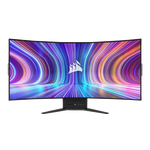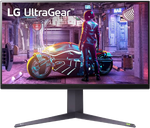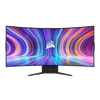A comparison of specs, key information, reviews, and best pricing from top retailers
Last updated -- hours ago | Report incorrect information
What we think

The PerfectRec monitor team Learn more
Updated April 11, 2024·
If you prioritize immersive gaming and watching high-quality HDR content, the Corsair 45WQHD240 with its wider color gamut and higher HDR brightness would deliver a stunning experience. However, for a balance between cost and performance, especially if you're into competitive gaming and appreciate sharper text and image clarity, the LG 32GQ850 offers a more affordable option without sacrificing too much on visual quality. Keep in mind, though, the Corsair's larger screen and OLED technology will provide deeper blacks and more vibrant colors, which may not be as pronounced on the LG's IPS panel. Give Feedback
this description is based on the product variant with some specs and product variant with some specs. At the time of writing, the variant with some specs cost some dollars and the variant with some specs cost some dollars.
Advantages of the Corsair 45WQHD240 (W-OLED)
- Very good for casual gaming
- Best in class contrast
- Excellent response time
Advantages of the LG 32GQ850 (IPS)
- The LG 32GQ850 (IPS) has no clear advantages over the Corsair 45WQHD240 (W-OLED).
Key differences
Casual Gaming
8.1


5.8
3440 x 1440
RESOLUTION
2560 x 1440
240Hz
REFRESH RATE
260Hz
Inf:1
NATIVE CONTRAST
1000:1
141 nits
SDR PEAK BRIGHTNESS
150 nits
632 nits
HDR PEAK BRIGHTNESS
600 nits
97.6 %
DCI-P3 COLOR GAMUT
98.0 %
Matte
COATING
Matte
The Corsair 45WQHD240 (W-OLED) is very good for casual gaming, while the LG 32GQ850 (IPS) is poor.
Productivity
3.9


5.0
3440 x 1440
RESOLUTION
2560 x 1440
84 PPI
PIXELS PER INCH
93 PPI
No
ADJUSTABLE STAND
Yes
Matte
COATING
Matte
The LG 32GQ850 (IPS) and Corsair 45WQHD240 (W-OLED) are both poor for productivity, though the LG 32GQ850 (IPS) is somewhat better.
Cost
$1,700


$718
$0
$500
$1,000
$1,500
$2,000
$2,500
$3,000
The Corsair 45WQHD240 (W-OLED) has a price of $1,700 and the LG 32GQ850 (IPS) costs $718.
HDR Gaming and Media Consumption
Yes


No
The Corsair 45WQHD240 (W-OLED) is suitable for HDR gaming and media consumption while the LG 32GQ850 (IPS) is not suitable for HDR gaming and media consumption.
Print Photo Editing
No


Yes
The Corsair 45WQHD240 (W-OLED) is not suitable for print photo editing while the LG 32GQ850 (IPS) is suitable for print photo editing.
Key similarities
Competitive Gaming
5.4


5.2
240Hz
REFRESH RATE
260Hz
1.6 ms
TOTAL RESPONSE TIME
8.0 ms
20 - 240 Hz
VARIABLE REFRESH RATE
48 - 260 Hz
No
STROBING / BFI
No
141 nits
SDR PEAK BRIGHTNESS
150 nits
The Corsair 45WQHD240 (W-OLED) and LG 32GQ850 (IPS) are both poor for competitive gaming.
Media Consumption
5.7


5.3
3440 x 1440
RESOLUTION
2560 x 1440
Inf:1
NATIVE CONTRAST
1000:1
141 nits
SDR PEAK BRIGHTNESS
150 nits
632 nits
HDR PEAK BRIGHTNESS
600 nits
Matte
COATING
Matte
The Corsair 45WQHD240 (W-OLED) and LG 32GQ850 (IPS) are both poor for media consumption.
Digital Photo Editing
Yes


Yes
Both the Corsair 45WQHD240 (W-OLED) and LG 32GQ850 (IPS) are suitable for digital photo editing.
HDR Video Editing and Color Grading
No


No
Both the Corsair 45WQHD240 (W-OLED) and LG 32GQ850 (IPS) are not suitable for HDR video editing and color grading.
Give feedback
We’re constantly working to improve.
How the Corsair 45WQHD240 (W-OLED) and the LG 32GQ850 (IPS) compare to other monitors
Spec Comparison
| Corsair 45WQHD240 (W-OLED) | LG 32GQ850 (IPS) |
GENERAL | |||
|---|---|---|---|
| Price | |||
$1,700 | $718 | ||
Screen Size | |||
Screen Size | 45" | 32" | |
Resolution | |||
Resolution | 3440 x 1440 | 2560 x 1440 | |
Screen Type | |||
Screen Type | OLED | LED | |
Screen Sub-type | |||
Screen Sub-type | W-OLED | IPS | |
Local Dimming Zones | |||
Local Dimming Zones | N/A | 16 | |
COLOR, CONTRAST & BRIGHTNESS | |||
|---|---|---|---|
Native Contrast | |||
Native Contrast | Inf:1 | 1000:1 | |
SDR Peak Brightness | |||
SDR Peak Brightness | 141 nits | 150 nits | |
HDR Peak Brightness | |||
HDR Peak Brightness | 632 nits | 600 nits | |
Suitable for HDR Gaming and Media Consumption | |||
Suitable for HDR Gaming and Media Consumption | Yes | No | |
sRGB Color Gamut | |||
sRGB Color Gamut | 99.6 % | 135 % | |
MOTION CHARACTERISTICS | |||
|---|---|---|---|
Total Response Time | |||
Total Response Time | 1.6 ms | 8 ms | |
Variable Refresh Rate | |||
Variable Refresh Rate | 20 - 240 Hz | 48 - 260 Hz | |
Strobing / BFI | |||
Strobing / BFI | No | No | |
Persistence Blur Score | |||
Persistence Blur Score | 8/10 | 8.3/10 | |
Ghosting Score | |||
Ghosting Score | 9.3/10 | 7.6/10 | |
TEXT & IMAGE CLARITY | |||
|---|---|---|---|
Pixels Per Inch | |||
Pixels Per Inch | 84 PPI | 93 PPI | |
Coating | |||
Coating | Matte | Matte | |
Text Clarity Score | |||
Text Clarity Score | 4/10 | 6.3/10 | |
Image Clarity Score | |||
Image Clarity Score | 5.1/10 | 6.3/10 | |
PORTS & CONNECTIVITY | |||
|---|---|---|---|
HDMI 1.4 Ports | |||
HDMI 1.4 Ports | 0 | 0 | |
HDMI 2.0 Ports | |||
HDMI 2.0 Ports | 0 | 0 | |
HDMI 2.1 Ports | |||
HDMI 2.1 Ports | 2 | 1 | |
Micro HDMI Ports | |||
Micro HDMI Ports | 0 | 0 | |
DisplayPort 1.2 Ports | |||
DisplayPort 1.2 Ports | 0 | 0 | |
Give feedback
We're constantly perfecting our model
More comparisons for you
Compare Corsair 45WQHD240 (W-OLED) vs. LG 45GR95QE (W-OLED)
VS
Compare Corsair 45WQHD240 (W-OLED) vs. LG 45GR95QE-B (W-OLED)
VS
Compare Corsair 45WQHD240 (W-OLED) vs. LG 45GS95QE (W-OLED)
VS
Compare LG 32GQ850 (IPS) vs. Innocn 27M2V (IPS MiniLED)
VS
Compare LG 32GQ850 (IPS) vs. Acer X34V (QD-OLED)
VS
Compare LG 32GQ850 (IPS) vs. AOC AG276QZD (W-OLED)
VS
FAQs
Why trust us
This information was produced and vetted by the PerfectRec monitors team. We are a product research and recommendation organization that meticulously reviews and evaluates the latest monitor information and makes it digestible for you.
By the numbers
210
Monitors evaluated
10,500
Monitors stats compiled
15
Proprietary Monitors ratings developed
117,800
Recommendations made
17,670
Consumer hours saved
About the monitor team
Joe Golden, Ph.D
CEO and Monitors Editor
Joe is an entrepreneur and lifelong electronics enthusiast with a Ph.D in Economics from the University of Michigan.
Jason Lew
Staff Expert & Software Engineer
Jason is a staff expert and software engineer that has been making laptop recommendations for 7 years and moderates one of the largest laptop subreddits.
Chandradeep Chowdhury
Staff Expert & Software Engineer
Chandradeep is a staff expert and software engineer and expert in televisions and monitors. He’s been making monitor recommendations for ten years.







